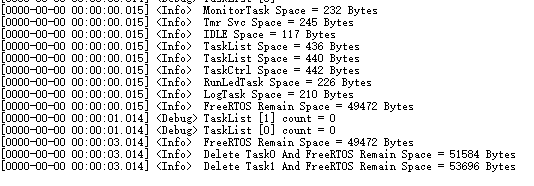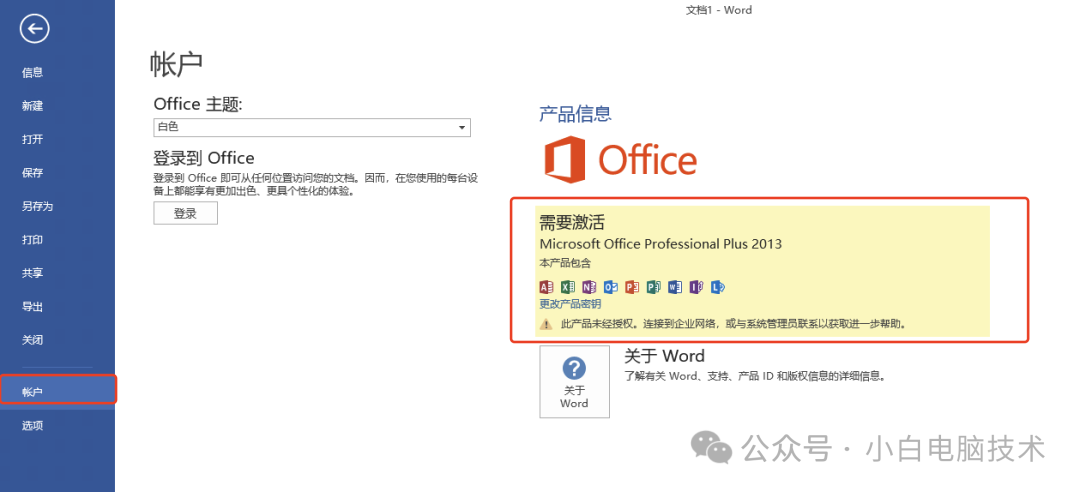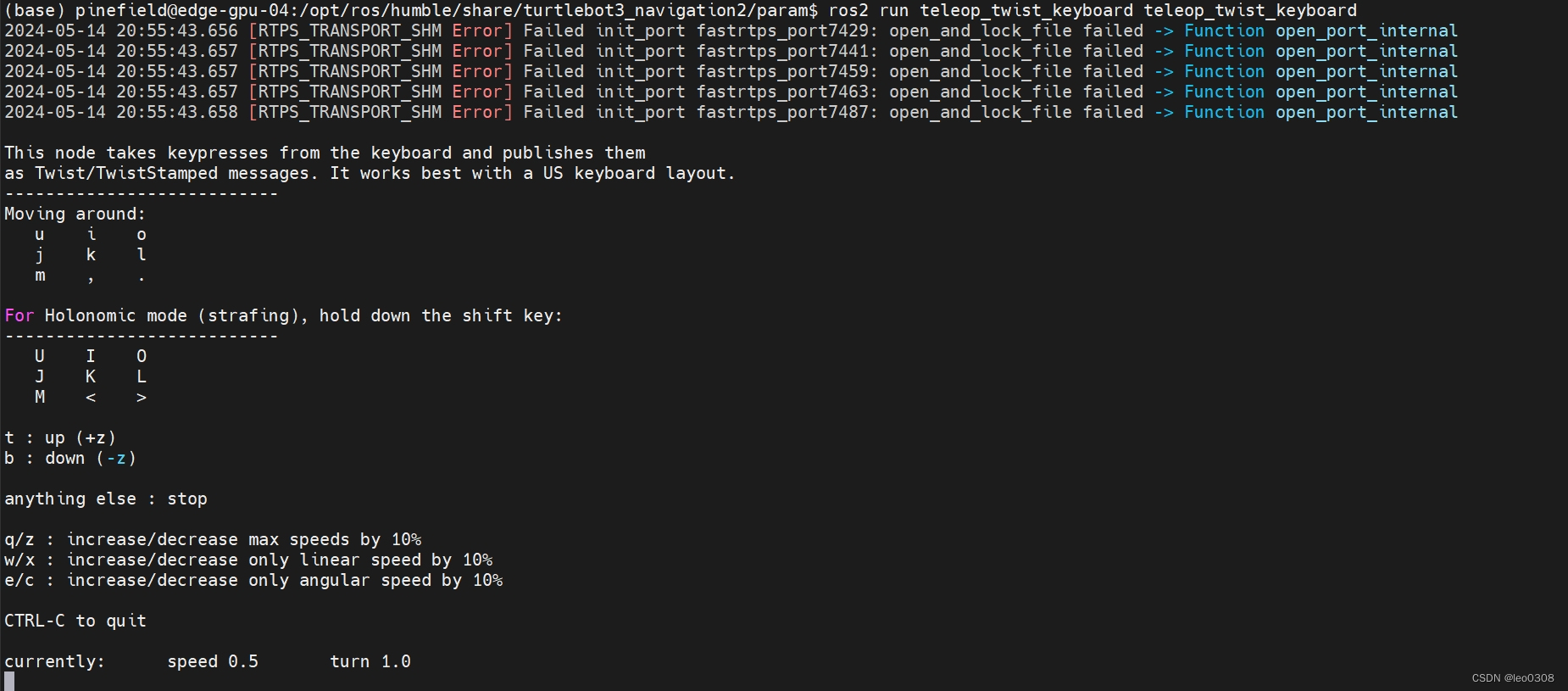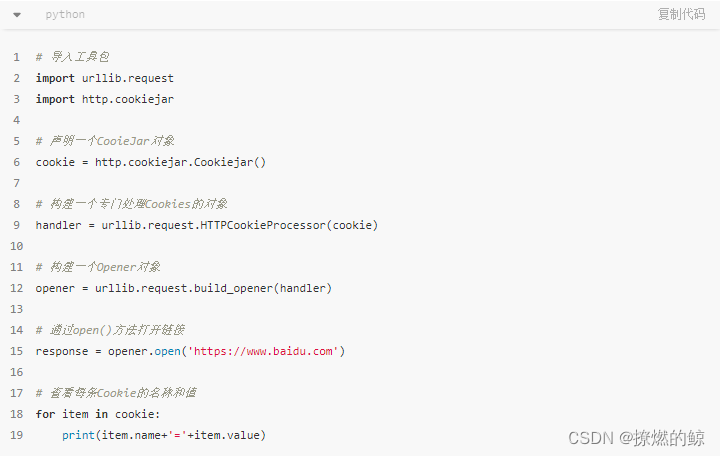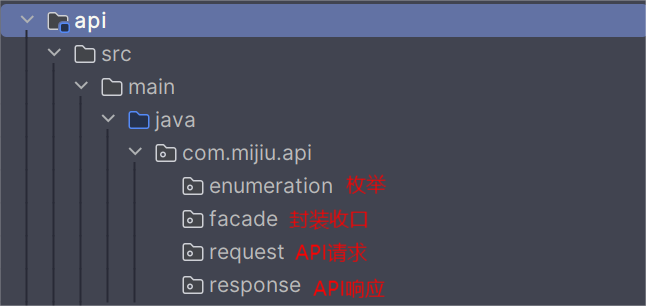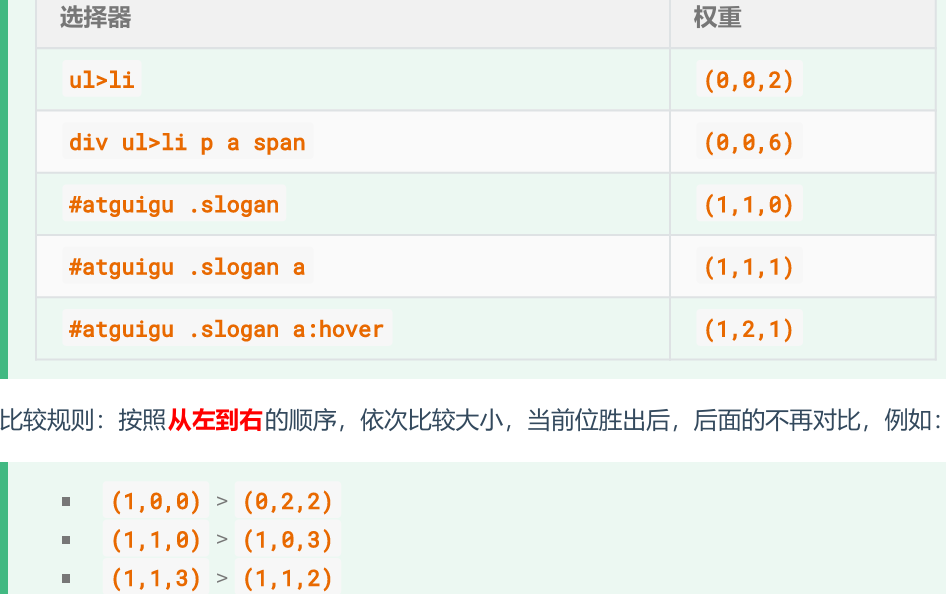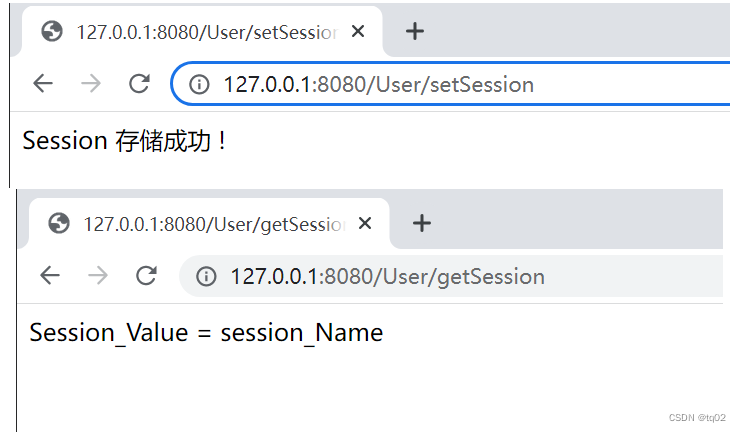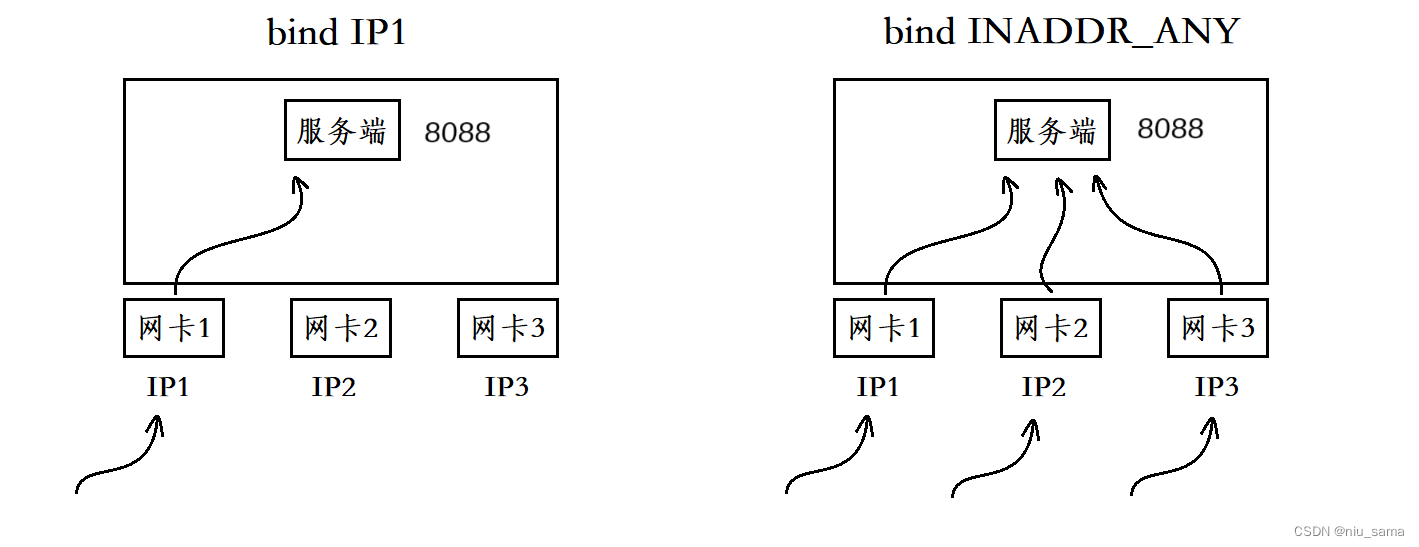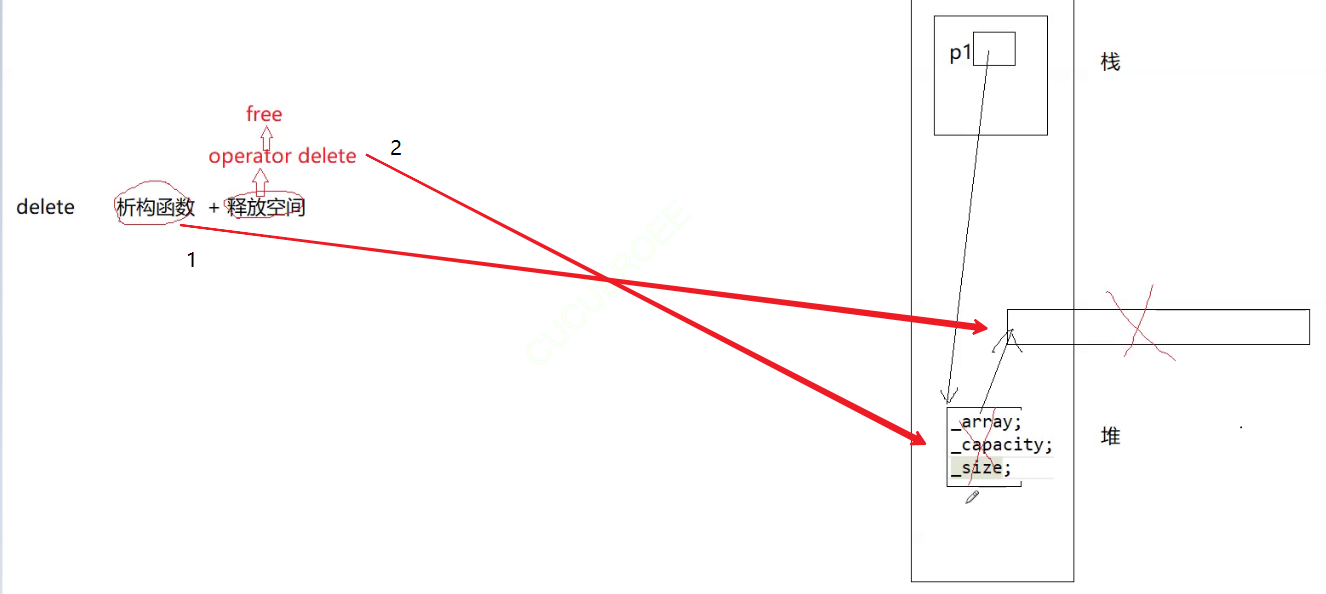可能每款成熟的金融app上架前都会经过层层安全检测才能执行上架,所以我隔三差五就能看到安全检测报告中提到的问题,根据问题的不同级别,处理的优先级也有所不同,此次讲的主要是一个 “轻度问题” ,个人认为属于那种可改不可改的状态
Tip:因并未重新进行安全检测,尚不确定该方式是否能解决实际提到的问题
人生处处是课堂
- 所遇问题
- 自我求知
- setAccessible
- 反射原理
- 解决过程
- 第一阶段
- 第二阶段
- 最终方案
- 解决方式
- ReflectionUtils
- ReflectionHelper
- 使用方式
- SecurityManager 相关思考
- 如何规避 setAccessible 风险?
- SecurityManager 如何给 setAccessible 授权?
- SecurityManager 如何使用?
所遇问题
漏洞描述:AccessibleObject 类 允许程序员绕过 由 Java 访问说明符提供的 访问控制(access control)检查,特别是他让程序员能够允许反射对象绕过 Java access control,并反过来更改私有字段或调用私有方法、行为,这些通常情况下都是不允许的 |
漏洞影响:不符合安全准则,绕过部分安全控制
解决建议:建议应用服务器或者应用程序使用 SecurityManager的。如果存在System.getSecurityManager则该方法会必须先经过它的同意才能调用(这条建议是安全中心给出的,然后我全局都搜索不到SecurityManager、System.getSecurityManager,起初先忽略了,回头看的时候在最后补充了相关内容)
触发安全风险的伪代码示例
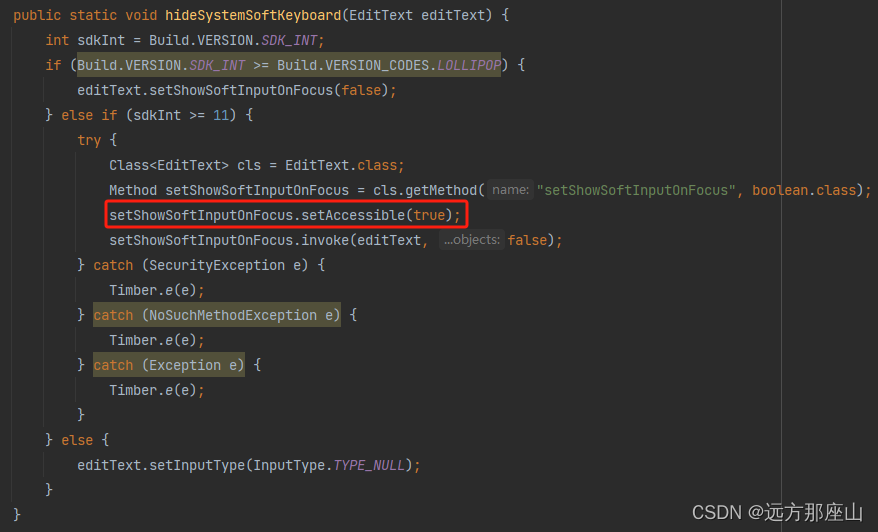
自我求知
解决问题的第一步是明确问题的产生原因,然后针对于此进行逐步解决
结论先行:项目中存在类(对象)操作的相关代码
当编译时,编译器会进行访问(权限)检查可以通过setAccessible方法屏蔽或者说禁用运行时访问检查
setAccessible
在安全中心给出的风险
代码段中 ,核心风险代码为setAccessible(true),那么有必要先了解一下此为何物
之前在 java setaccessible 用处 中看到一个简短描述,提示了可能存在潜在风险

按照我看源码的猜想,不论访问权限是(public、private)哪种,
setAccessible在底层中默认应该都是false,意味着都需要接受权限检查,主要区别在于public可以通过检查,而private通不过
setAccessible(boolean flag) 方法是 AccessibleObject 类中的一个方法,它是 Field、 Method、Constructor的公共父类。
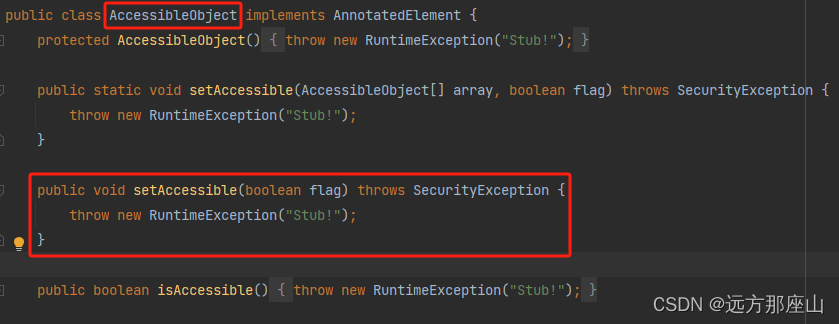
通过反射Class类后,以下三种都是其内部可反射的范围,当触发这些场景将执行运行时访问检查:
- Field(字段) 设置字段(set(Object obj, Object value))或获取字段(get(Object obj))
- Method(方法) 调用方法(invoke(Object obj, Object… args))
- Constructor(构造函数) 创建和初始化类的新实例(newInstance(Object… initargs))
反射原理
Java反射是一种强大的特性,它允许程序在运行时动态地获取和操作类的信息。通过反射,我们可以创建对象、调用方法和访问字段,而不需要提前知道类的具体定义。
Java反射的原理基于Java的运行时数据区域(Runtime Data Area)和类加载机制。当Java虚拟机加载一个类时,它将类的字节码文件加载到内存中,并在方法区创建一个Class对象来表示该类。
因为Class对象包含了类的完整信息,包括类的构造函数、方法、字段等;所以可以通过反射提供的一系列方法在运行时来获取Class对象、获取构造函数、获取方法、获取字段等。
解决过程
起初看到这个问题,我认为是没必要解决,所以直接拒了需求方,然后因为工作态度就被上了一课,然后直接给我发了一个别人的处理方式 - field.setAccessible(true);代码扫描有安全漏洞,解决方案
第一阶段
AccessibleObject类是 Field、Method和Constructor对象的基类,能够允许反射对象修改访问权限修饰符,绕过由Java访问修饰符提供的访问控制检查。它让程序员能够更改私有字段或调用私有方法,这在通常情况下是不允许的!
例如:以下代码片段中,将Field将accessible标记设置为true。
Class clazz = User.class;
Field field = clazz.getField("name");
field.setAccessible(true);
如果为false,则其中的私有字段不能够被访问到的,所以不可以注掉。
ReflectionUtils.makeAccessible(field);
个人想法:起初不确定是用 ReflectionUtils.makeAccessible(field) 替换 field.setAccessible(true) ,还行是在尾端加入ReflectionUtils.makeAccessible(field) ,所以可以先看看源码(后续会提到该类详情),可以看出在源码中做了权限检查后才确定是否禁用权限检查
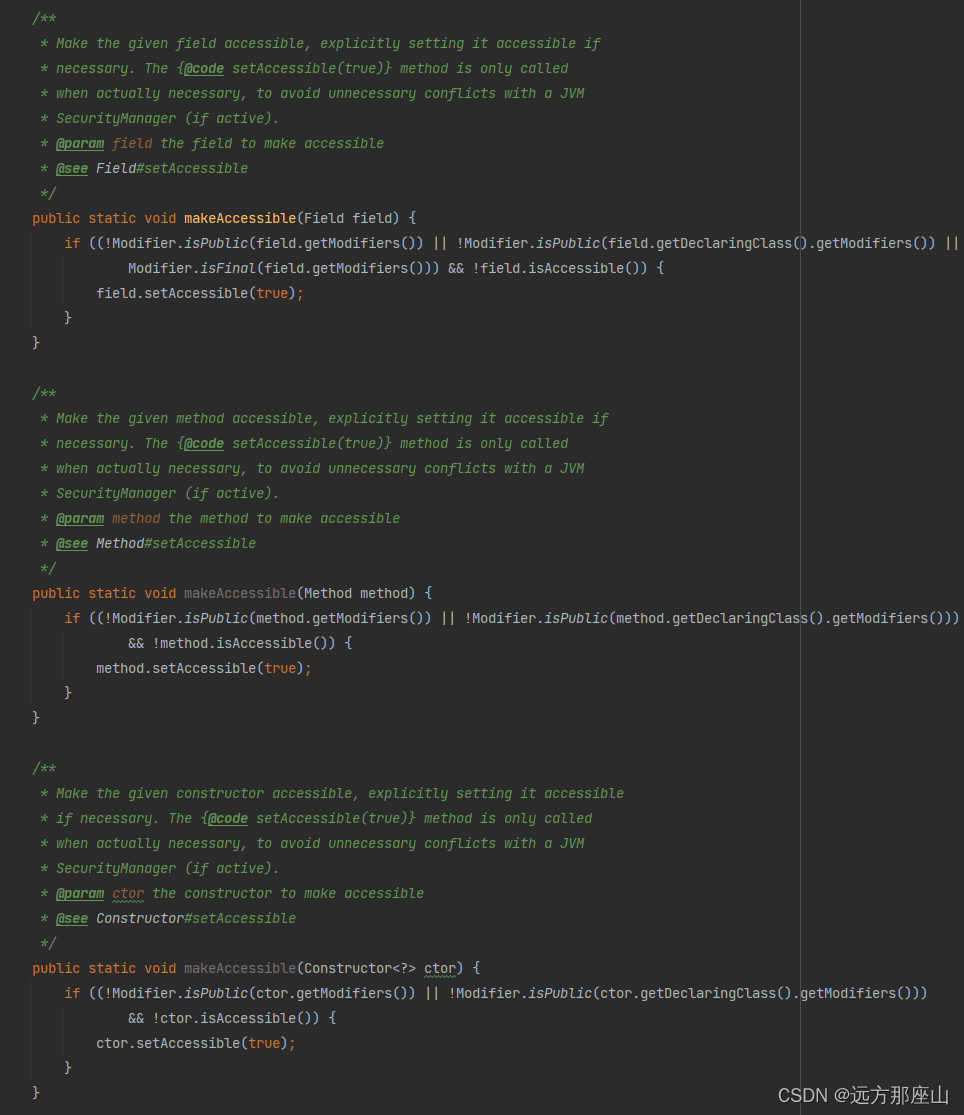
调用代码,类似如下
Class clazz = User.class;
Field field = clazz.getField("name");
ReflectionUtils.makeAccessible(field);
第二阶段
因为这里并未提供 ReflectionUtils 工具类,所以自行搜索到了 ReflectionUtils反射工具:精要介绍与实战应用指南
作者说:org.springframework.util.
ReflectionUtils 是 Spring 框架提供的一个反射工具类,它封装了 Java 反射 API 的一些常用操作,使得我们能够更加方便、简洁地使用反射功能…
这篇Blog内并不是一无所获,至少我们可以看到这款工具类的相关调用方式!
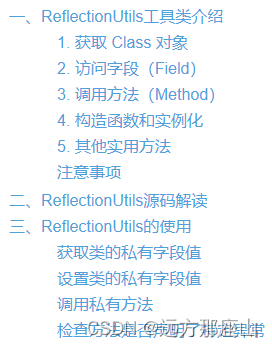
那么接了下来我们就去找一下 Android 的 ReflectionUtils 工具类
最终方案
经自我查证和同事推荐,主要找到俩种方法,处理方式应该是一样的,但是这种方法是否真的能解决问题?我目前对最终结果保持怀疑态度
解决方式
ReflectionUtils
找了半天在 Android反射机制简单理解,ReflectionUtils 反射工具类 看到一个类似的 ReflectionUtils(可直接copy)
package xxx;
import java.lang.reflect.Constructor;
import java.lang.reflect.Field;
import java.lang.reflect.InvocationTargetException;
import java.lang.reflect.Method;
import java.lang.reflect.Modifier;
import java.lang.reflect.UndeclaredThrowableException;
import java.sql.SQLException;
import java.util.ArrayList;
import java.util.Arrays;
import java.util.List;
import java.util.regex.Pattern;
public class ReflectionUtils {
/**
* Pattern for detecting CGLIB-renamed methods.
* @see #isCglibRenamedMethod
*/
private static final Pattern CGLIB_RENAMED_METHOD_PATTERN = Pattern.compile("CGLIB\\$(.+)\\$\\d+");
/**
* Attempt to find a {@link Field field} on the supplied {@link Class} with the
* supplied {@code name}. Searches all superclasses up to {@link Object}.
* @param clazz the class to introspect
* @param name the name of the field
* @return the corresponding Field object, or {@code null} if not found
*/
public static Field findField(Class<?> clazz, String name) {
return findField(clazz, name, null);
}
/**
* Attempt to find a {@link Field field} on the supplied {@link Class} with the
* supplied {@code name} and/or {@link Class type}. Searches all superclasses
* up to {@link Object}.
* @param clazz the class to introspect
* @param name the name of the field (may be {@code null} if type is specified)
* @param type the type of the field (may be {@code null} if name is specified)
* @return the corresponding Field object, or {@code null} if not found
*/
public static Field findField(Class<?> clazz, String name, Class<?> type) {
//Assert.notNull(clazz, "Class must not be null");
//Assert.isTrue(name != null || type != null, "Either name or type of the field must be specified");
Class<?> searchType = clazz;
while (!Object.class.equals(searchType) && searchType != null) {
Field[] fields = searchType.getDeclaredFields();
for (Field field : fields) {
if ((name == null || name.equals(field.getName())) && (type == null || type.equals(field.getType()))) {
return field;
}
}
searchType = searchType.getSuperclass();
}
return null;
}
/**
* Set the field represented by the supplied {@link Field field object} on the
* specified {@link Object target object} to the specified {@code value}.
* In accordance with {@link Field#set(Object, Object)} semantics, the new value
* is automatically unwrapped if the underlying field has a primitive type.
* <p>Thrown exceptions are handled via a call to {@link #handleReflectionException(Exception)}.
* @param field the field to set
* @param target the target object on which to set the field
* @param value the value to set; may be {@code null}
*/
public static void setField(Field field, Object target, Object value) {
try {
field.set(target, value);
}
catch (IllegalAccessException ex) {
handleReflectionException(ex);
throw new IllegalStateException(
"Unexpected reflection exception - " + ex.getClass().getName() + ": " + ex.getMessage());
}
}
/**
* Get the field represented by the supplied {@link Field field object} on the
* specified {@link Object target object}. In accordance with {@link Field#get(Object)}
* semantics, the returned value is automatically wrapped if the underlying field
* has a primitive type.
* <p>Thrown exceptions are handled via a call to {@link #handleReflectionException(Exception)}.
* @param field the field to get
* @param target the target object from which to get the field
* @return the field's current value
*/
public static Object getField(Field field, Object target) {
try {
return field.get(target);
}
catch (IllegalAccessException ex) {
handleReflectionException(ex);
throw new IllegalStateException(
"Unexpected reflection exception - " + ex.getClass().getName() + ": " + ex.getMessage());
}
}
/**
* Attempt to find a {@link Method} on the supplied class with the supplied name
* and no parameters. Searches all superclasses up to {@code Object}.
* <p>Returns {@code null} if no {@link Method} can be found.
* @param clazz the class to introspect
* @param name the name of the method
* @return the Method object, or {@code null} if none found
*/
public static Method findMethod(Class<?> clazz, String name) {
return findMethod(clazz, name, new Class<?>[0]);
}
/**
* Attempt to find a {@link Method} on the supplied class with the supplied name
* and parameter types. Searches all superclasses up to {@code Object}.
* <p>Returns {@code null} if no {@link Method} can be found.
* @param clazz the class to introspect
* @param name the name of the method
* @param paramTypes the parameter types of the method
* (may be {@code null} to indicate any signature)
* @return the Method object, or {@code null} if none found
*/
public static Method findMethod(Class<?> clazz, String name, Class<?>... paramTypes) {
//Assert.notNull(clazz, "Class must not be null");
//Assert.notNull(name, "Method name must not be null");
Class<?> searchType = clazz;
while (searchType != null) {
Method[] methods = (searchType.isInterface() ? searchType.getMethods() : searchType.getDeclaredMethods());
for (Method method : methods)
if (name.equals(method.getName()) &&
(paramTypes == null || Arrays.equals(paramTypes, method.getParameterTypes()))) {
return method;
}
searchType = searchType.getSuperclass();
}
return null;
}
/**
* Invoke the specified {@link Method} against the supplied target object with no arguments.
* The target object can be {@code null} when invoking a static {@link Method}.
* <p>Thrown exceptions are handled via a call to {@link #handleReflectionException}.
* @param method the method to invoke
* @param target the target object to invoke the method on
* @return the invocation result, if any
* @see #invokeMethod(Method, Object, Object[])
*/
public static Object invokeMethod(Method method, Object target) {
return invokeMethod(method, target, new Object[0]);
}
/**
* Invoke the specified {@link Method} against the supplied target object with the
* supplied arguments. The target object can be {@code null} when invoking a
* static {@link Method}.
* <p>Thrown exceptions are handled via a call to {@link #handleReflectionException}.
* @param method the method to invoke
* @param target the target object to invoke the method on
* @param args the invocation arguments (may be {@code null})
* @return the invocation result, if any
*/
public static Object invokeMethod(Method method, Object target, Object... args) {
try {
return method.invoke(target, args);
}
catch (Exception ex) {
handleReflectionException(ex);
}
throw new IllegalStateException("Should never get here");
}
/**
* Invoke the specified JDBC API {@link Method} against the supplied target
* object with no arguments.
* @param method the method to invoke
* @param target the target object to invoke the method on
* @return the invocation result, if any
* @throws SQLException the JDBC API SQLException to rethrow (if any)
* @see #invokeJdbcMethod(Method, Object, Object[])
*/
public static Object invokeJdbcMethod(Method method, Object target) throws SQLException {
return invokeJdbcMethod(method, target, new Object[0]);
}
/**
* Invoke the specified JDBC API {@link Method} against the supplied target
* object with the supplied arguments.
* @param method the method to invoke
* @param target the target object to invoke the method on
* @param args the invocation arguments (may be {@code null})
* @return the invocation result, if any
* @throws SQLException the JDBC API SQLException to rethrow (if any)
* @see #invokeMethod(Method, Object, Object[])
*/
public static Object invokeJdbcMethod(Method method, Object target, Object... args) throws SQLException {
try {
return method.invoke(target, args);
}
catch (IllegalAccessException ex) {
handleReflectionException(ex);
}
catch (InvocationTargetException ex) {
if (ex.getTargetException() instanceof SQLException) {
throw (SQLException) ex.getTargetException();
}
handleInvocationTargetException(ex);
}
throw new IllegalStateException("Should never get here");
}
/**
* Handle the given reflection exception. Should only be called if no
* checked exception is expected to be thrown by the target method.
* <p>Throws the underlying RuntimeException or Error in case of an
* InvocationTargetException with such a root cause. Throws an
* IllegalStateException with an appropriate message else.
* @param ex the reflection exception to handle
*/
public static void handleReflectionException(Exception ex) {
if (ex instanceof NoSuchMethodException) {
throw new IllegalStateException("Method not found: " + ex.getMessage());
}
if (ex instanceof IllegalAccessException) {
throw new IllegalStateException("Could not access method: " + ex.getMessage());
}
if (ex instanceof InvocationTargetException) {
handleInvocationTargetException((InvocationTargetException) ex);
}
if (ex instanceof RuntimeException) {
throw (RuntimeException) ex;
}
throw new UndeclaredThrowableException(ex);
}
/**
* Handle the given invocation target exception. Should only be called if no
* checked exception is expected to be thrown by the target method.
* <p>Throws the underlying RuntimeException or Error in case of such a root
* cause. Throws an IllegalStateException else.
* @param ex the invocation target exception to handle
*/
public static void handleInvocationTargetException(InvocationTargetException ex) {
rethrowRuntimeException(ex.getTargetException());
}
/**
* Rethrow the given {@link Throwable exception}, which is presumably the
* <em>target exception</em> of an {@link InvocationTargetException}. Should
* only be called if no checked exception is expected to be thrown by the
* target method.
* <p>Rethrows the underlying exception cast to an {@link RuntimeException} or
* {@link Error} if appropriate; otherwise, throws an
* {@link IllegalStateException}.
* @param ex the exception to rethrow
* @throws RuntimeException the rethrown exception
*/
public static void rethrowRuntimeException(Throwable ex) {
if (ex instanceof RuntimeException) {
throw (RuntimeException) ex;
}
if (ex instanceof Error) {
throw (Error) ex;
}
throw new UndeclaredThrowableException(ex);
}
/**
* Rethrow the given {@link Throwable exception}, which is presumably the
* <em>target exception</em> of an {@link InvocationTargetException}. Should
* only be called if no checked exception is expected to be thrown by the
* target method.
* <p>Rethrows the underlying exception cast to an {@link Exception} or
* {@link Error} if appropriate; otherwise, throws an
* {@link IllegalStateException}.
* @param ex the exception to rethrow
* @throws Exception the rethrown exception (in case of a checked exception)
*/
public static void rethrowException(Throwable ex) throws Exception {
if (ex instanceof Exception) {
throw (Exception) ex;
}
if (ex instanceof Error) {
throw (Error) ex;
}
throw new UndeclaredThrowableException(ex);
}
/**
* Determine whether the given method explicitly declares the given
* exception or one of its superclasses, which means that an exception of
* that type can be propagated as-is within a reflective invocation.
* @param method the declaring method
* @param exceptionType the exception to throw
* @return {@code true} if the exception can be thrown as-is;
* {@code false} if it needs to be wrapped
*/
public static boolean declaresException(Method method, Class<?> exceptionType) {
//Assert.notNull(method, "Method must not be null");
Class<?>[] declaredExceptions = method.getExceptionTypes();
for (Class<?> declaredException : declaredExceptions) {
if (declaredException.isAssignableFrom(exceptionType)) {
return true;
}
}
return false;
}
/**
* Determine whether the given field is a "public static final" constant.
* @param field the field to check
*/
public static boolean isPublicStaticFinal(Field field) {
int modifiers = field.getModifiers();
return (Modifier.isPublic(modifiers) && Modifier.isStatic(modifiers) && Modifier.isFinal(modifiers));
}
/**
* Determine whether the given method is an "equals" method.
* @see Object#equals(Object)
*/
public static boolean isEqualsMethod(Method method) {
if (method == null || !method.getName().equals("equals")) {
return false;
}
Class<?>[] paramTypes = method.getParameterTypes();
return (paramTypes.length == 1 && paramTypes[0] == Object.class);
}
/**
* Determine whether the given method is a "hashCode" method.
* @see Object#hashCode()
*/
public static boolean isHashCodeMethod(Method method) {
return (method != null && method.getName().equals("hashCode") && method.getParameterTypes().length == 0);
}
/**
* Determine whether the given method is a "toString" method.
* @see Object#toString()
*/
public static boolean isToStringMethod(Method method) {
return (method != null && method.getName().equals("toString") && method.getParameterTypes().length == 0);
}
/**
* Determine whether the given method is originally declared by {@link Object}.
*/
public static boolean isObjectMethod(Method method) {
if (method == null) {
return false;
}
try {
Object.class.getDeclaredMethod(method.getName(), method.getParameterTypes());
return true;
}
catch (Exception ex) {
return false;
}
}
/**
* Determine whether the given method is a CGLIB 'renamed' method,
* following the pattern "CGLIB$methodName$0".
* @param renamedMethod the method to check
* @see //org.springframework.cglib.proxy.Enhancer#rename
*/
public static boolean isCglibRenamedMethod(Method renamedMethod) {
return CGLIB_RENAMED_METHOD_PATTERN.matcher(renamedMethod.getName()).matches();
}
/**
* Make the given field accessible, explicitly setting it accessible if
* necessary. The {@code setAccessible(true)} method is only called
* when actually necessary, to avoid unnecessary conflicts with a JVM
* SecurityManager (if active).
* @param field the field to make accessible
* @see Field#setAccessible
*/
public static void makeAccessible(Field field) {
if ((!Modifier.isPublic(field.getModifiers()) || !Modifier.isPublic(field.getDeclaringClass().getModifiers()) ||
Modifier.isFinal(field.getModifiers())) && !field.isAccessible()) {
field.setAccessible(true);
}
}
/**
* Make the given method accessible, explicitly setting it accessible if
* necessary. The {@code setAccessible(true)} method is only called
* when actually necessary, to avoid unnecessary conflicts with a JVM
* SecurityManager (if active).
* @param method the method to make accessible
* @see Method#setAccessible
*/
public static void makeAccessible(Method method) {
if ((!Modifier.isPublic(method.getModifiers()) || !Modifier.isPublic(method.getDeclaringClass().getModifiers()))
&& !method.isAccessible()) {
method.setAccessible(true);
}
}
/**
* Make the given constructor accessible, explicitly setting it accessible
* if necessary. The {@code setAccessible(true)} method is only called
* when actually necessary, to avoid unnecessary conflicts with a JVM
* SecurityManager (if active).
* @param ctor the constructor to make accessible
* @see Constructor#setAccessible
*/
public static void makeAccessible(Constructor<?> ctor) {
if ((!Modifier.isPublic(ctor.getModifiers()) || !Modifier.isPublic(ctor.getDeclaringClass().getModifiers()))
&& !ctor.isAccessible()) {
ctor.setAccessible(true);
}
}
/**
* Perform the given callback operation on all matching methods of the given
* class and superclasses.
* <p>The same named method occurring on subclass and superclass will appear
* twice, unless excluded by a {@link MethodFilter}.
* @param clazz class to start looking at
* @param mc the callback to invoke for each method
* @see #doWithMethods(Class, MethodCallback, MethodFilter)
*/
public static void doWithMethods(Class<?> clazz, MethodCallback mc) throws IllegalArgumentException {
doWithMethods(clazz, mc, null);
}
/**
* Perform the given callback operation on all matching methods of the given
* class and superclasses (or given interface and super-interfaces).
* <p>The same named method occurring on subclass and superclass will appear
* twice, unless excluded by the specified {@link MethodFilter}.
* @param clazz class to start looking at
* @param mc the callback to invoke for each method
* @param mf the filter that determines the methods to apply the callback to
*/
public static void doWithMethods(Class<?> clazz, MethodCallback mc, MethodFilter mf)
throws IllegalArgumentException {
// Keep backing up the inheritance hierarchy.
Method[] methods = clazz.getDeclaredMethods();
for (Method method : methods) {
if (mf != null && !mf.matches(method)) {
continue;
}
try {
mc.doWith(method);
}
catch (IllegalAccessException ex) {
throw new IllegalStateException("Shouldn't be illegal to access method '" + method.getName()
+ "': " + ex);
}
}
if (clazz.getSuperclass() != null) {
doWithMethods(clazz.getSuperclass(), mc, mf);
}
else if (clazz.isInterface()) {
for (Class<?> superIfc : clazz.getInterfaces()) {
doWithMethods(superIfc, mc, mf);
}
}
}
/**
* Get all declared methods on the leaf class and all superclasses. Leaf
* class methods are included first.
*/
public static Method[] getAllDeclaredMethods(Class<?> leafClass) throws IllegalArgumentException {
final List<Method> methods = new ArrayList<Method>(32);
doWithMethods(leafClass, new MethodCallback() {
public void doWith(Method method) {
methods.add(method);
}
});
return methods.toArray(new Method[methods.size()]);
}
/**
* Get the unique set of declared methods on the leaf class and all superclasses. Leaf
* class methods are included first and while traversing the superclass hierarchy any methods found
* with signatures matching a method already included are filtered out.
*/
public static Method[] getUniqueDeclaredMethods(Class<?> leafClass) throws IllegalArgumentException {
final List<Method> methods = new ArrayList<Method>(32);
doWithMethods(leafClass, new MethodCallback() {
public void doWith(Method method) {
boolean knownSignature = false;
Method methodBeingOverriddenWithCovariantReturnType = null;
for (Method existingMethod : methods) {
if (method.getName().equals(existingMethod.getName()) &&
Arrays.equals(method.getParameterTypes(), existingMethod.getParameterTypes())) {
// Is this a covariant return type situation?
if (existingMethod.getReturnType() != method.getReturnType() &&
existingMethod.getReturnType().isAssignableFrom(method.getReturnType())) {
methodBeingOverriddenWithCovariantReturnType = existingMethod;
}
else {
knownSignature = true;
}
break;
}
}
if (methodBeingOverriddenWithCovariantReturnType != null) {
methods.remove(methodBeingOverriddenWithCovariantReturnType);
}
if (!knownSignature && !isCglibRenamedMethod(method)) {
methods.add(method);
}
}
});
return methods.toArray(new Method[methods.size()]);
}
/**
* Invoke the given callback on all fields in the target class, going up the
* class hierarchy to get all declared fields.
* @param clazz the target class to analyze
* @param fc the callback to invoke for each field
*/
public static void doWithFields(Class<?> clazz, FieldCallback fc) throws IllegalArgumentException {
doWithFields(clazz, fc, null);
}
/**
* Invoke the given callback on all fields in the target class, going up the
* class hierarchy to get all declared fields.
* @param clazz the target class to analyze
* @param fc the callback to invoke for each field
* @param ff the filter that determines the fields to apply the callback to
*/
public static void doWithFields(Class<?> clazz, FieldCallback fc, FieldFilter ff)
throws IllegalArgumentException {
// Keep backing up the inheritance hierarchy.
Class<?> targetClass = clazz;
do {
Field[] fields = targetClass.getDeclaredFields();
for (Field field : fields) {
// Skip static and final fields.
if (ff != null && !ff.matches(field)) {
continue;
}
try {
fc.doWith(field);
}
catch (IllegalAccessException ex) {
throw new IllegalStateException(
"Shouldn't be illegal to access field '" + field.getName() + "': " + ex);
}
}
targetClass = targetClass.getSuperclass();
}
while (targetClass != null && targetClass != Object.class);
}
/**
* Given the source object and the destination, which must be the same class
* or a subclass, copy all fields, including inherited fields. Designed to
* work on objects with public no-arg constructors.
* @throws IllegalArgumentException if the arguments are incompatible
*/
public static void shallowCopyFieldState(final Object src, final Object dest) throws IllegalArgumentException {
if (src == null) {
throw new IllegalArgumentException("Source for field copy cannot be null");
}
if (dest == null) {
throw new IllegalArgumentException("Destination for field copy cannot be null");
}
if (!src.getClass().isAssignableFrom(dest.getClass())) {
throw new IllegalArgumentException("Destination class [" + dest.getClass().getName()
+ "] must be same or subclass as source class [" + src.getClass().getName() + "]");
}
doWithFields(src.getClass(), new FieldCallback() {
public void doWith(Field field) throws IllegalArgumentException, IllegalAccessException {
makeAccessible(field);
Object srcValue = field.get(src);
field.set(dest, srcValue);
}
}, COPYABLE_FIELDS);
}
/**
* Action to take on each method.
*/
public interface MethodCallback {
/**
* Perform an operation using the given method.
* @param method the method to operate on
*/
void doWith(Method method) throws IllegalArgumentException, IllegalAccessException;
}
/**
* Callback optionally used to filter methods to be operated on by a method callback.
*/
public interface MethodFilter {
/**
* Determine whether the given method matches.
* @param method the method to check
*/
boolean matches(Method method);
}
/**
* Callback interface invoked on each field in the hierarchy.
*/
public interface FieldCallback {
/**
* Perform an operation using the given field.
* @param field the field to operate on
*/
void doWith(Field field) throws IllegalArgumentException, IllegalAccessException;
}
/**
* Callback optionally used to filter fields to be operated on by a field callback.
*/
public interface FieldFilter {
/**
* Determine whether the given field matches.
* @param field the field to check
*/
boolean matches(Field field);
}
/**
* Pre-built FieldFilter that matches all non-static, non-final fields.
*/
public static FieldFilter COPYABLE_FIELDS = new FieldFilter() {
public boolean matches(Field field) {
return !(Modifier.isStatic(field.getModifiers()) || Modifier.isFinal(field.getModifiers()));
}
};
/**
* Pre-built MethodFilter that matches all non-bridge methods.
*/
public static MethodFilter NON_BRIDGED_METHODS = new MethodFilter() {
public boolean matches(Method method) {
return !method.isBridge();
}
};
/**
* Pre-built MethodFilter that matches all non-bridge methods
* which are not declared on {@code java.lang.Object}.
*/
public static MethodFilter USER_DECLARED_METHODS = new MethodFilter() {
public boolean matches(Method method) {
return (!method.isBridge() && method.getDeclaringClass() != Object.class);
}
};
}
ReflectionHelper
ReflectionHelper 是 google.gson 提供的一个类,有需要的话可以引入 gson 依赖,不确定copy后是否可直接使用(如果有包内关联类的话,最好是引入依赖)
package com.google.gson.internal.reflect;
import com.google.gson.JsonIOException;
import com.google.gson.internal.GsonBuildConfig;
import java.lang.reflect.AccessibleObject;
import java.lang.reflect.Constructor;
import java.lang.reflect.Field;
import java.lang.reflect.Method;
public class ReflectionHelper {
private static final RecordHelper RECORD_HELPER;
static {
RecordHelper instance;
try {
// Try to construct the RecordSupportedHelper, if this fails, records are not supported on this JVM.
instance = new RecordSupportedHelper();
} catch (NoSuchMethodException e) {
instance = new RecordNotSupportedHelper();
}
RECORD_HELPER = instance;
}
private ReflectionHelper() {}
/**
* Internal implementation of making an {@link AccessibleObject} accessible.
*
* @param object the object that {@link AccessibleObject#setAccessible(boolean)} should be called on.
* @throws JsonIOException if making the object accessible fails
*/
public static void makeAccessible(AccessibleObject object) throws JsonIOException {
try {
object.setAccessible(true);
} catch (Exception exception) {
String description = getAccessibleObjectDescription(object, false);
throw new JsonIOException("Failed making " + description + " accessible; either increase its visibility"
+ " or write a custom TypeAdapter for its declaring type.", exception);
}
}
/**
* Returns a short string describing the {@link AccessibleObject} in a human-readable way.
* The result is normally shorter than {@link AccessibleObject#toString()} because it omits
* modifiers (e.g. {@code final}) and uses simple names for constructor and method parameter
* types.
*
* @param object object to describe
* @param uppercaseFirstLetter whether the first letter of the description should be uppercased
*/
public static String getAccessibleObjectDescription(AccessibleObject object, boolean uppercaseFirstLetter) {
String description;
if (object instanceof Field) {
description = "field '" + fieldToString((Field) object) + "'";
} else if (object instanceof Method) {
Method method = (Method) object;
StringBuilder methodSignatureBuilder = new StringBuilder(method.getName());
appendExecutableParameters(method, methodSignatureBuilder);
String methodSignature = methodSignatureBuilder.toString();
description = "method '" + method.getDeclaringClass().getName() + "#" + methodSignature + "'";
} else if (object instanceof Constructor) {
description = "constructor '" + constructorToString((Constructor<?>) object) + "'";
} else {
description = "<unknown AccessibleObject> " + object.toString();
}
if (uppercaseFirstLetter && Character.isLowerCase(description.charAt(0))) {
description = Character.toUpperCase(description.charAt(0)) + description.substring(1);
}
return description;
}
/**
* Creates a string representation for a field, omitting modifiers and
* the field type.
*/
public static String fieldToString(Field field) {
return field.getDeclaringClass().getName() + "#" + field.getName();
}
/**
* Creates a string representation for a constructor.
* E.g.: {@code java.lang.String(char[], int, int)}
*/
public static String constructorToString(Constructor<?> constructor) {
StringBuilder stringBuilder = new StringBuilder(constructor.getDeclaringClass().getName());
appendExecutableParameters(constructor, stringBuilder);
return stringBuilder.toString();
}
// Note: Ideally parameter type would be java.lang.reflect.Executable, but that was added in Java 8
private static void appendExecutableParameters(AccessibleObject executable, StringBuilder stringBuilder) {
stringBuilder.append('(');
Class<?>[] parameters = (executable instanceof Method)
? ((Method) executable).getParameterTypes()
: ((Constructor<?>) executable).getParameterTypes();
for (int i = 0; i < parameters.length; i++) {
if (i > 0) {
stringBuilder.append(", ");
}
stringBuilder.append(parameters[i].getSimpleName());
}
stringBuilder.append(')');
}
/**
* Tries making the constructor accessible, returning an exception message
* if this fails.
*
* @param constructor constructor to make accessible
* @return exception message; {@code null} if successful, non-{@code null} if
* unsuccessful
*/
public static String tryMakeAccessible(Constructor<?> constructor) {
try {
constructor.setAccessible(true);
return null;
} catch (Exception exception) {
return "Failed making constructor '" + constructorToString(constructor) + "' accessible;"
+ " either increase its visibility or write a custom InstanceCreator or TypeAdapter for"
// Include the message since it might contain more detailed information
+ " its declaring type: " + exception.getMessage();
}
}
/** If records are supported on the JVM, this is equivalent to a call to Class.isRecord() */
public static boolean isRecord(Class<?> raw) {
return RECORD_HELPER.isRecord(raw);
}
public static String[] getRecordComponentNames(Class<?> raw) {
return RECORD_HELPER.getRecordComponentNames(raw);
}
/** Looks up the record accessor method that corresponds to the given record field */
public static Method getAccessor(Class<?> raw, Field field) {
return RECORD_HELPER.getAccessor(raw, field);
}
public static <T> Constructor<T> getCanonicalRecordConstructor(Class<T> raw) {
return RECORD_HELPER.getCanonicalRecordConstructor(raw);
}
public static RuntimeException createExceptionForUnexpectedIllegalAccess(
IllegalAccessException exception) {
throw new RuntimeException("Unexpected IllegalAccessException occurred (Gson " + GsonBuildConfig.VERSION + ")."
+ " Certain ReflectionAccessFilter features require Java >= 9 to work correctly. If you are not using"
+ " ReflectionAccessFilter, report this to the Gson maintainers.",
exception);
}
private static RuntimeException createExceptionForRecordReflectionException(
ReflectiveOperationException exception) {
throw new RuntimeException("Unexpected ReflectiveOperationException occurred"
+ " (Gson " + GsonBuildConfig.VERSION + ")."
+ " To support Java records, reflection is utilized to read out information"
+ " about records. All these invocations happens after it is established"
+ " that records exist in the JVM. This exception is unexpected behavior.",
exception);
}
/**
* Internal abstraction over reflection when Records are supported.
*/
private abstract static class RecordHelper {
abstract boolean isRecord(Class<?> clazz);
abstract String[] getRecordComponentNames(Class<?> clazz);
abstract <T> Constructor<T> getCanonicalRecordConstructor(Class<T> raw);
public abstract Method getAccessor(Class<?> raw, Field field);
}
private static class RecordSupportedHelper extends RecordHelper {
private final Method isRecord;
private final Method getRecordComponents;
private final Method getName;
private final Method getType;
private RecordSupportedHelper() throws NoSuchMethodException {
isRecord = Class.class.getMethod("isRecord");
getRecordComponents = Class.class.getMethod("getRecordComponents");
// Class java.lang.reflect.RecordComponent
Class<?> classRecordComponent = getRecordComponents.getReturnType().getComponentType();
getName = classRecordComponent.getMethod("getName");
getType = classRecordComponent.getMethod("getType");
}
@Override
boolean isRecord(Class<?> raw) {
try {
return (boolean) isRecord.invoke(raw);
} catch (ReflectiveOperationException e) {
throw createExceptionForRecordReflectionException(e);
}
}
@Override
String[] getRecordComponentNames(Class<?> raw) {
try {
Object[] recordComponents = (Object[]) getRecordComponents.invoke(raw);
String[] componentNames = new String[recordComponents.length];
for (int i = 0; i < recordComponents.length; i++) {
componentNames[i] = (String) getName.invoke(recordComponents[i]);
}
return componentNames;
} catch (ReflectiveOperationException e) {
throw createExceptionForRecordReflectionException(e);
}
}
@Override
public <T> Constructor<T> getCanonicalRecordConstructor(Class<T> raw) {
try {
Object[] recordComponents = (Object[]) getRecordComponents.invoke(raw);
Class<?>[] recordComponentTypes = new Class<?>[recordComponents.length];
for (int i = 0; i < recordComponents.length; i++) {
recordComponentTypes[i] = (Class<?>) getType.invoke(recordComponents[i]);
}
// Uses getDeclaredConstructor because implicit constructor has same visibility as record and might
// therefore not be public
return raw.getDeclaredConstructor(recordComponentTypes);
} catch (ReflectiveOperationException e) {
throw createExceptionForRecordReflectionException(e);
}
}
@Override
public Method getAccessor(Class<?> raw, Field field) {
try {
// Records consists of record components, each with a unique name, a corresponding field and accessor method
// with the same name. Ref.: https://docs.oracle.com/javase/specs/jls/se17/html/jls-8.html#jls-8.10.3
return raw.getMethod(field.getName());
} catch (ReflectiveOperationException e) {
throw createExceptionForRecordReflectionException(e);
}
}
}
/**
* Instance used when records are not supported
*/
private static class RecordNotSupportedHelper extends RecordHelper {
@Override
boolean isRecord(Class<?> clazz) {
return false;
}
@Override
String[] getRecordComponentNames(Class<?> clazz) {
throw new UnsupportedOperationException(
"Records are not supported on this JVM, this method should not be called");
}
@Override
<T> Constructor<T> getCanonicalRecordConstructor(Class<T> raw) {
throw new UnsupportedOperationException(
"Records are not supported on this JVM, this method should not be called");
}
@Override
public Method getAccessor(Class<?> raw, Field field) {
throw new UnsupportedOperationException(
"Records are not supported on this JVM, this method should not be called");
}
}
}
使用方式
仅需在原 setAccessible(true) 处采用 ReflectionHelper.makeAccessible(xxx) 或 ReflectionUtils.makeAccessible(xxx) 替换即可
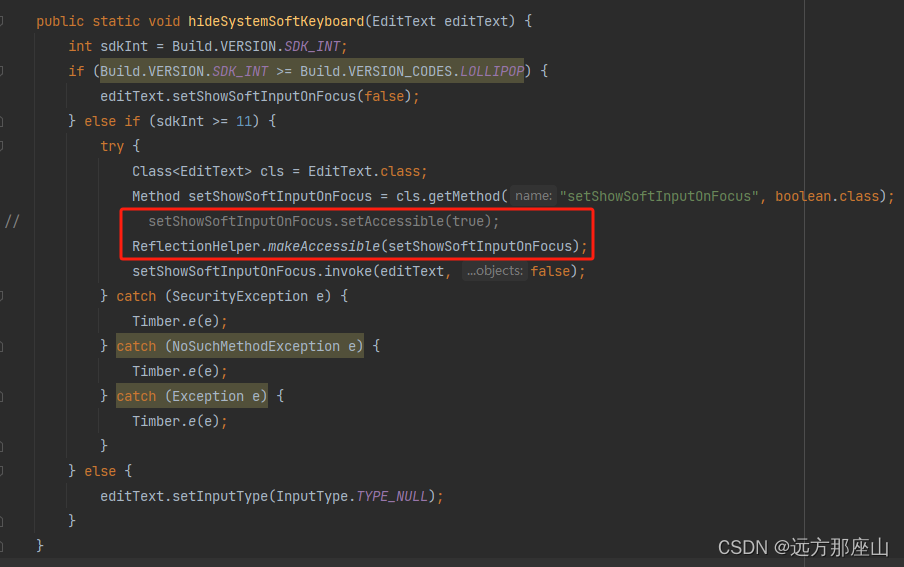
SecurityManager 相关思考
在此之前我应该没了解过 SecurityManager ,这次应该是首次,以下主要是我的一些答疑
如何规避 setAccessible 风险?
Hint:伪代码其实就已经做了 try、catch 操作
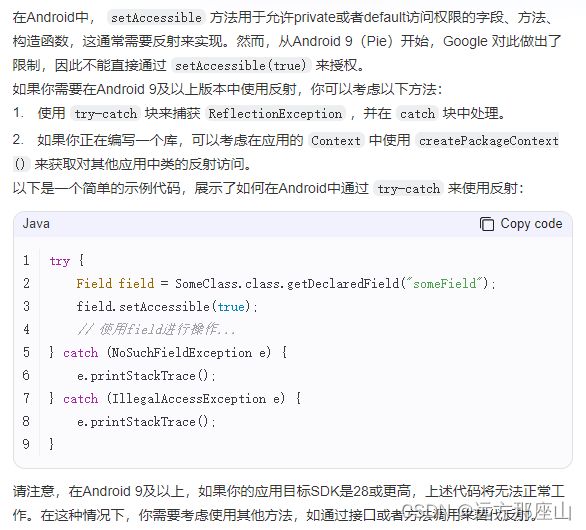
SecurityManager 如何给 setAccessible 授权?
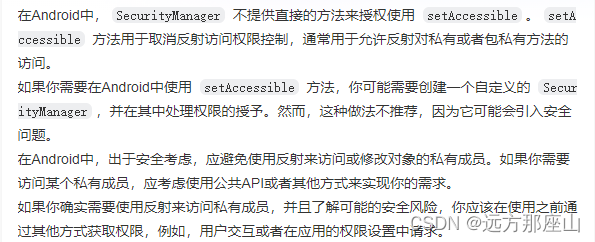
我理解的:根据结果来看就是不建议使用 setAccessible,如果要使用就用 SecurityManager 授权,但即使这样也不保证就能解决安全风险?
SecurityManager 如何使用?
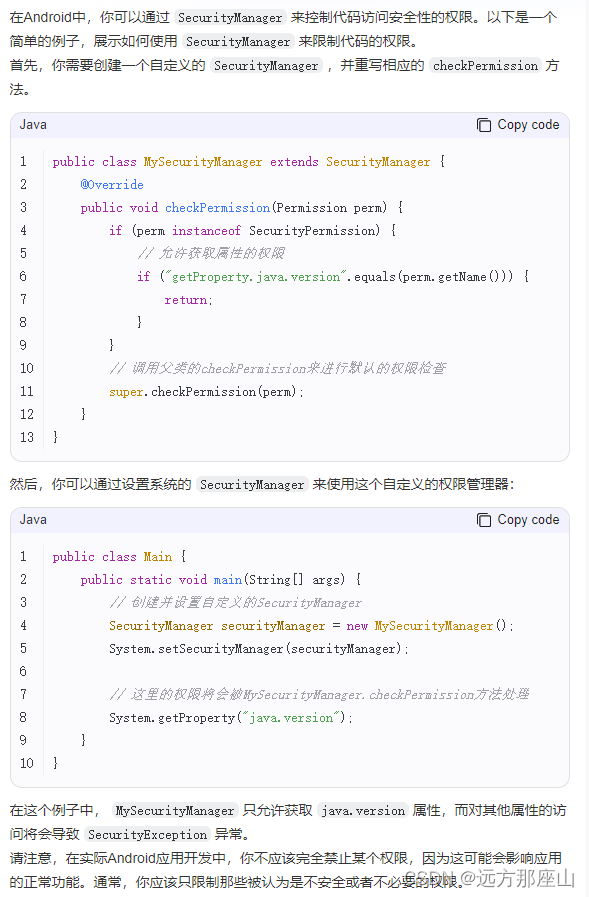

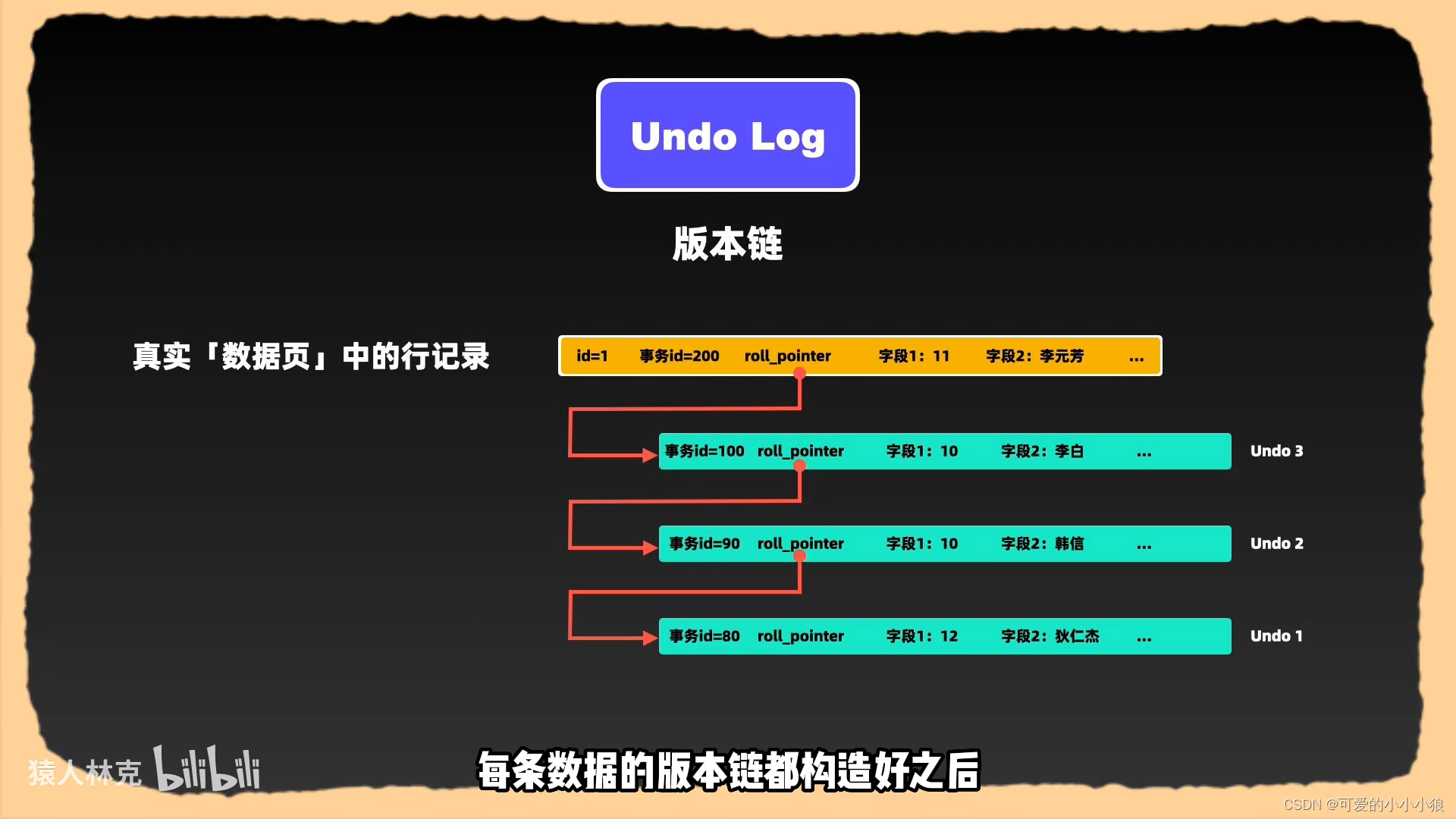
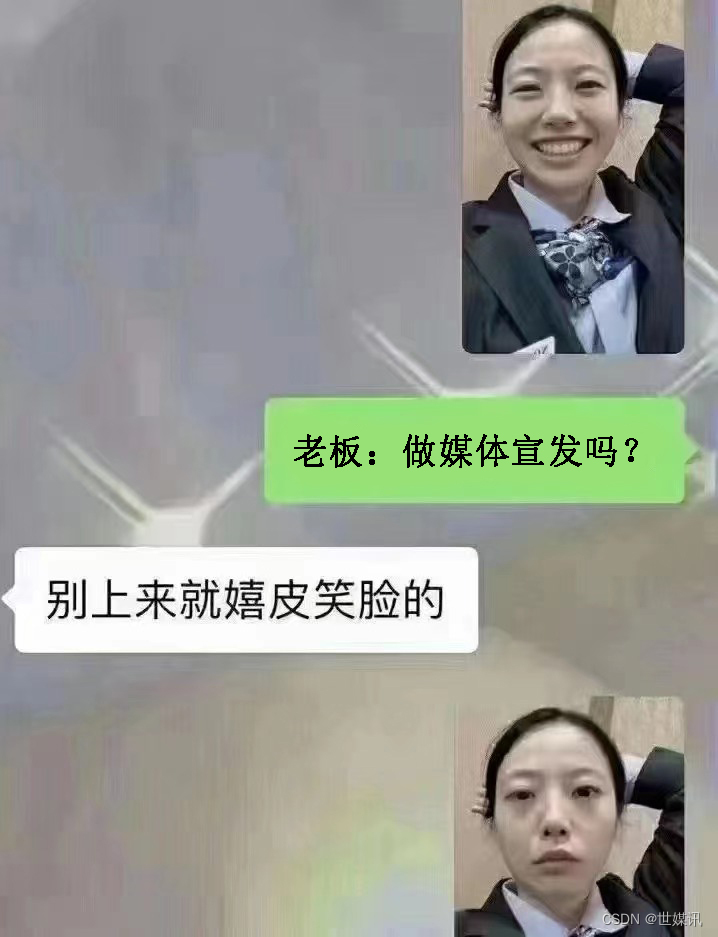
![[动画详解]LeetCode151.翻转字符串里的单词](https://img-blog.csdnimg.cn/direct/6f594249c0f7473dad7adba588aec775.gif)



